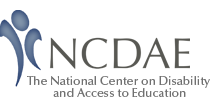Accreditation and Web Accessibility: Why Should Accreditors Care?
Equitable access to higher education has long been recognized as a challenge experienced by many individuals, including those from racial and ethnic groups, women, students from low socioeconomic status and students with disabilities. Today, many of the barriers that have historically limited these students’ ability to succeed have been removed or reduced.
However, while many obstacles to higher education are less of an issue, for some students with disabilities, simply gaining physical access to a higher education institution is not enough. Many students still do not have equal access to course content. While buildings and physical spaces have been constructed to be accessible, digital materials and instructional websites should likewise be created to provide fair and equitable access to all. Without equal access to digital information, including institutional websites, students with disabilities face unnecessary barriers to their success.
Access to an institution’s website is integral to an increasing number of functions in higher education today. These functions go well beyond online courses and course materials: essential activities such as registration, library services, and testing require online interaction. Moreover, most faculty and staff must utilize digital environments and the institutional web in order to do their work and participate in the mission of the institution.
Given the growing reliance on digital environments, it is essential that all students, faculty, and staff members have the access they need to succeed. This includes those with disabilities who may be dependent on the accessibility and usability of those environments to participate fully in higher education and the activities of their institution (as seen in the video of individuals with disabilities in higher ed video). The need for accessibility is gaining further momentum as more persons with disabilities engage in higher education, including returning veterans who now have a disability as well as lifelong learners aging into disability.
Why should accreditation commissions and review teams care?
Providing an inclusive and supportive environment for teaching and learning is a critical part of postsecondary education and a central tenet of the accreditation philosophy. Therefore, accreditors and review teams should support and encourage institutions as they take a leadership role to develop, procure and maintain accessible digital materials and institutional web content.
Web accessibility also maps onto the standards and criteria of all regional accrediting agencies and is in line with many quality improvement plans. It also provides a number of value-added benefits for constituent institutions — most of which can support their reaffirmation submissions:
Web Accessibility affects student outcomes:
- Materials that are natively accessible provide an equivalent educational experience
- Inaccessible content affects timeliness — putting students at a serious disadvantage during a period in education when just-in-time learning, communities of practice, and critical thinking pedagogies proliferate
- Accessible materials allow students to be independent in their studies — inaccessible materials can make it impossible to complete their work without help
- Accessibility enhances learning for other student groups:
- Those for whom English is a second language
- Students with different learning styles
- Multimodal learners (e.g., visual or aural learners)
- Those using older equipment or in environments where they cannot fully utilize their equipment (e.g., in places where it is difficult to hear or where sound is not allowed, captioned videos can be helpful)
Web accessibility makes sound financial policy:
- Accessibility is more efficient than after-the-fact fixes.
- Institutions who do not address web accessibility are at risk for litigation and may run afoul of evolving legislation
- Institutional web content that is accessible assists in recruitment and retention of students and faculty with disabilities
- Funding agencies have begun to require accessible information communication for grants and contracts
- Accessibility enhances collaborative possibilities in both the US and abroad since many require it already
- Accessibility is good for public relations and development (e.g., campus fund raising campaigns)
Web accessibility supports technology:
- Accessible websites often follow current web standards. Thus, these sites are more likely to maintain their integrity as technologies evolve and be compatible with newer browsers and emerging technologies (forward compatible)
- Accessible content also tends to have a higher return on prominent search engines
- Web designs that are accessible are usually more robust. This means it should work more reliably across different browsers and devices, such as tablets and mobile phones
Web accessibility aligns with institutional mission statements and strategic planning initiatives:
- 86% of institutional mission statements in a national sample contained language supportive of web accessibility. It shows a commitment to quality student outcomes, employee productivity, and supports diversity at all levels (based on a 2008 survey by the GOALS project
- An accessible web presence promotes an institution as socially responsible and attuned to the needs of potential users.
How can you help your member institutions?
As representatives of an accreditation agency, you can help your institutions to improve web accessibility (and thus institutional quality) across their systems and we would like to help!
Project GOALS (Gaining Online Accessible Learning through Self-Study) worked with consortium partner SACSCOC (Southern Association of Colleges and Schools- Commission on Colleges) to create resources that can be used by regional accreditors and their constituent institutions to promote these efforts and to leverage accessibility work during the accreditation or reaffirmation process. In conjunction with these institutional resources, Project GOALS also developed a set of materials to be used specifically by review teams and accrediting entities to understand and evaluate evidence of web accessibility during reaffirmation.
Are there any resources that would help your accreditation body or review team? Please contact us, we would love to hear from you about materials that you would want us to develop!


